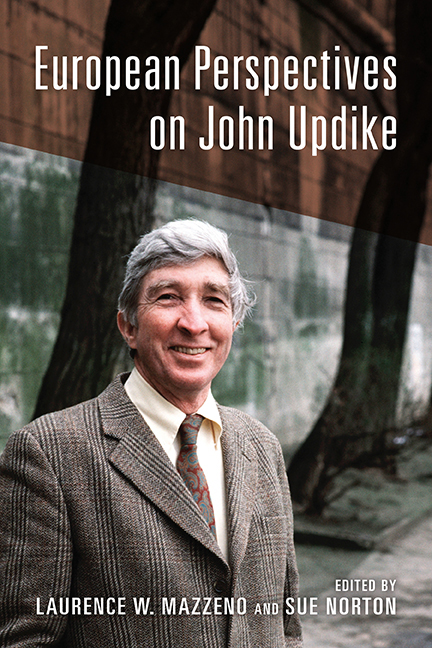Book contents
- Frontmatter
- Contents
- Acknowledgments
- List of Abbreviations
- Introduction: Updike as Europeans See Him
- Part I Coming of Age, Aging in Time
- Part II Love, American Style
- Part III Amazing Grace, American Faith
- 7 Psalmist of the Everyday: Late Updike, Aesthetics, and the Language of Praise
- 8 Guilt, Shame, and Hope in Updike's Short Fiction: “The Music School,” “Guilt-Gems,” and “Deaths of Distant Friends”
- 9 Signs of Omission? Socialist Erasure of Religion in John Updike's Work
- Part IV Old World Myths, New World News
- Sources for Further Study
- Notes on the Contributors
- Index
8 - Guilt, Shame, and Hope in Updike's Short Fiction: “The Music School,” “Guilt-Gems,” and “Deaths of Distant Friends”
from Part III - Amazing Grace, American Faith
Published online by Cambridge University Press: 15 August 2018
- Frontmatter
- Contents
- Acknowledgments
- List of Abbreviations
- Introduction: Updike as Europeans See Him
- Part I Coming of Age, Aging in Time
- Part II Love, American Style
- Part III Amazing Grace, American Faith
- 7 Psalmist of the Everyday: Late Updike, Aesthetics, and the Language of Praise
- 8 Guilt, Shame, and Hope in Updike's Short Fiction: “The Music School,” “Guilt-Gems,” and “Deaths of Distant Friends”
- 9 Signs of Omission? Socialist Erasure of Religion in John Updike's Work
- Part IV Old World Myths, New World News
- Sources for Further Study
- Notes on the Contributors
- Index
Summary
IN HIS 1978 INTERVIEW with Charlie Reilly, John Updike (1994) refuted the idea that he was mostly a novelist. Asserting his gift for short fiction, he put the record straight, saying, “More and more I seem to be reduced to that although I persist in writing short stories…. The short story may be what I do best” (126). Indeed, just like dozens of other Updike stories, “The Music School,” “Guilt-Gems,” and “Deaths of Distant Friends” amply justify Alison Lurie's (1988) laudatory view of the American author as “the Chekhov of American suburbia” (3). Moreover, in his essay “The Short Story and I,” Updike himself offered a rough definition of the short story as “a shaped and polished fragment of life” (MM, 765), to which it could be added, specifically of moral life, and especially in relation to these three stories. In fact, “The Music School” (1966), “Guilt-Gems” (1979), and “Deaths of Distant Friends” (1987), written almost three decades apart, focus mainly on moral behavior and moral emotions, particularly guilt and its sibling, shame, which together create a narrative environment of suffering. As Richard Kraut (2013) puts it, “Our term ‘suffering,’ when used as an opposite to ‘happiness,’ names … a group of disagreeable feelings: sadness, fear, grief … guilt, shame” (681). However, Updike's reader, though immersed in the affliction pervasive in the narrative, does not necessarily come away with a sense of doom but, paradoxically, with some hope. Contrary to guilt and shame, which relate to the present and the past, hope points toward the future. In his exploration of guilt and shame, then, Updike paints the tableau of an ethical life that finally entails the possibility of some hope.
Guilt and shame, both negatively valenced, “self-conscious” emotions, imply a gap between moral standards and moral behavior, in particular behavior likely to have negative consequences for the happiness of others and for which there is widespread social censure. In “The Music School,” “Guilt-Gems,” and “Deaths of Distant Friends,” these emotion are evoked by either the narrator's or the main character's self-reflection and self-evaluation.
- Type
- Chapter
- Information
- European Perspectives on John Updike , pp. 119 - 133Publisher: Boydell & BrewerPrint publication year: 2018



